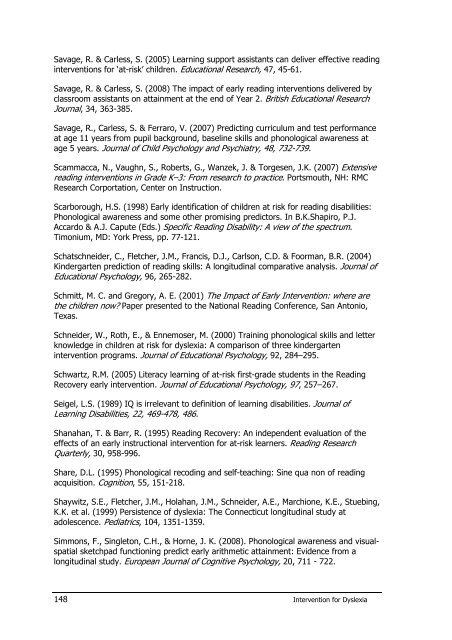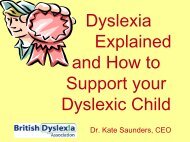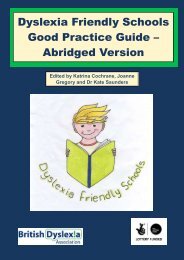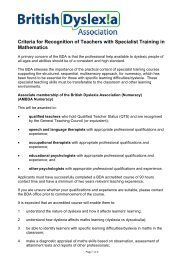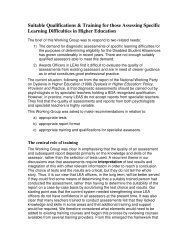Intervention for Dyslexia - The British Dyslexia Association
Intervention for Dyslexia - The British Dyslexia Association
Intervention for Dyslexia - The British Dyslexia Association
You also want an ePaper? Increase the reach of your titles
YUMPU automatically turns print PDFs into web optimized ePapers that Google loves.
Savage, R. & Carless, S. (2005) Learning support assistants can deliver effective reading<br />
interventions <strong>for</strong> ‘at-risk’ children. Educational Research, 47, 45-61.<br />
Savage, R. & Carless, S. (2008) <strong>The</strong> impact of early reading interventions delivered by<br />
classroom assistants on attainment at the end of Year 2. <strong>British</strong> Educational Research<br />
Journal, 34, 363-385.<br />
Savage, R., Carless, S. & Ferraro, V. (2007) Predicting curriculum and test per<strong>for</strong>mance<br />
at age 11 years from pupil background, baseline skills and phonological awareness at<br />
age 5 years. Journal of Child Psychology and Psychiatry, 48, 732-739.<br />
Scammacca, N., Vaughn, S., Roberts, G., Wanzek, J. & Torgesen, J.K. (2007) Extensive<br />
reading interventions in Grade K–3: From research to practice. Portsmouth, NH: RMC<br />
Research Corportation, Center on Instruction.<br />
Scarborough, H.S. (1998) Early identification of children at risk <strong>for</strong> reading disabilities:<br />
Phonological awareness and some other promising predictors. In B.K.Shapiro, P.J.<br />
Accardo & A.J. Capute (Eds.) Specific Reading Disability: A view of the spectrum.<br />
Timonium, MD: York Press, pp. 77-121.<br />
Schatschneider, C., Fletcher, J.M., Francis, D.J., Carlson, C.D. & Foorman, B.R. (2004)<br />
Kindergarten prediction of reading skills: A longitudinal comparative analysis. Journal of<br />
Educational Psychology, 96, 265-282.<br />
Schmitt, M. C. and Gregory, A. E. (2001) <strong>The</strong> Impact of Early <strong>Intervention</strong>: where are<br />
the children now? Paper presented to the National Reading Conference, San Antonio,<br />
Texas.<br />
Schneider, W., Roth, E., & Ennemoser, M. (2000) Training phonological skills and letter<br />
knowledge in children at risk <strong>for</strong> dyslexia: A comparison of three kindergarten<br />
intervention programs. Journal of Educational Psychology, 92, 284–295.<br />
Schwartz, R.M. (2005) Literacy learning of at-risk first-grade students in the Reading<br />
Recovery early intervention. Journal of Educational Psychology, 97, 257–267.<br />
Seigel, L.S. (1989) IQ is irrelevant to definition of learning disabilities. Journal of<br />
Learning Disabilities, 22, 469-478, 486.<br />
Shanahan, T. & Barr, R. (1995) Reading Recovery: An independent evaluation of the<br />
effects of an early instructional intervention <strong>for</strong> at-risk learners. Reading Research<br />
Quarterly, 30, 958-996.<br />
Share, D.L. (1995) Phonological recoding and self-teaching: Sine qua non of reading<br />
acquisition. Cognition, 55, 151-218.<br />
Shaywitz, S.E., Fletcher, J.M., Holahan, J.M., Schneider, A.E., Marchione, K.E., Stuebing,<br />
K.K. et al. (1999) Persistence of dyslexia: <strong>The</strong> Connecticut longitudinal study at<br />
adolescence. Pediatrics, 104, 1351-1359.<br />
Simmons, F., Singleton, C.H., & Horne, J. K. (2008). Phonological awareness and visualspatial<br />
sketchpad functioning predict early arithmetic attainment: Evidence from a<br />
longitudinal study. European Journal of Cognitive Psychology, 20, 711 - 722.<br />
148 <strong>Intervention</strong> <strong>for</strong> <strong>Dyslexia</strong>


